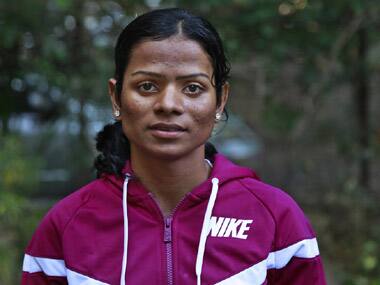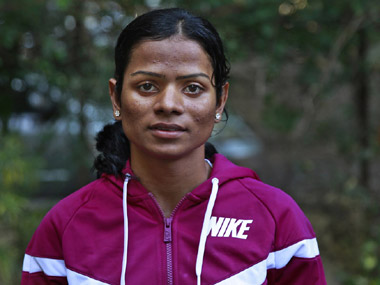Pulled out from the squad for the Glasgow Commonwealth Games (CWG) at the last minute last year and sidelined from international competition ever since, Odisha’s promising sprinter Dutee Chand is understandably ecstatic after the Lausanne based Court of Arbitration for Sports (CAS) suspended the controversial hyperandrogenism rule of the International Association of Athletic Federations (IAAF) for two years — and allowed her to participate in all international events. Talking to Firstpost over the phone from Hyderabad where she is training, Dutee Chand said with the ban out of the way, her sight is now set firmly on the Rio Olympics next year. “My first target now is to achieve the qualifying mark of 11.32 seconds in the 100-meter and 23.20 seconds in the 200-meter,” Dutee said. [caption id=“attachment_2371174” align=“alignleft” width=“380”]  “My first target now is to achieve the qualifying mark of 11.32 seconds in the 100-meter and 23.20 seconds in the 200-meter,” Dutee said. AP[/caption] But as Dr Payoshini Mitra, an advisor to the Sports Authority of India (SAI) on gender issues and her biggest source of support during the past year, is at pains to emphasise, the significance of the CAS ruling goes far beyond Dutee and even Indian sports. “It would be a mistake to consider it as a victory for Indian sports. It is a victory for all those who believe that sports must go beyond mere competition and be inclusive,” she says. Dutee herself realises that it is a landmark verdict that would bring relief for athletes around the world who have been – or would be – sidelined from competition because of naturally occurring excess testosterone in the body. “It is not as if I am cheating to enhance my performance. It is something that God has given me and I – and others like me – should not be punished for something that we have no control over,” says the star sprinter, who is among the foremost medal winning hopes at the Rio Olympics, given her past performance. Chand was the first Indian sprinter to reach a final at a global athletics event in 2013. She was the national champion in the 100m and 200m, her two favourite events, and an Asian Games bronze medallist. Dutee is the first to admit that her performance had gone steadily downhill after the ban, hitting its nadir at the national athletics meet in Chennai recently where she finished a poor third. “I was completely shattered after the ban last year and just could not concentrate on the training regimen with the intensity I normally do,” she says. But now that the ban has been lifted, there is a spring in her feet again. “I will do all it takes to get into reckoning for the Rio Olympics. But I am banking on the Indian government for an opportunity to train in the USA for the big event,” she says. The ban had singed not just Dutee, but her entire family back in Gopalpur village in Odisha’s Jajpur district, where she had to deal with barbs aimed at her for a year now. “People would call her all kinds of names and she would cry inconsolably whenever she was home. I consoled her saying she should have faith in Lord Jagannath and sure enough He has repaid that faith. It is a Nabakalebara for my daughter just as the Lord Himself is having His Nabakalebara,” Dutee’s mother Akhuji told Firstpost effusively at her home on Tuesday. Dutee’s elder sister Saraswati, herself an athlete and her biggest support during the trying times, has no doubt that given the right kind training facilities, her sister has it in her what it takes to win an Olympic medal. Dutee’s father Chakradhar, a weaver by profession, finds it tough to provide for a family of nine, including six daughters, but that has not prevented him from giving her all the support and encouragement she needed to pursue her interest in sports. “Her extraordinary talent was visible when she was still in school. I told her to stop thinking about the condition of the family and pursue her interest in all sincerity,” Chakradhar said. Dutee’s neighbour Ashok Dutta, however, insists that it was not just talent, but hard work that has taken Dutee where she has reached. “Her commitment and devotion to her chosen field was exemplary,” said Ashok, who has seen her practice on the river bank, in sand and in knee-deep water since childhood. The whole village is now waiting for Dutee to do what no other Indian athlete has done so far: win a medal in athletics in the Olympic.
“My first target now is to achieve the qualifying mark of 11.32 seconds in the 100-meter and 23.20 seconds in the 200-meter,” Dutee said.
Advertisement
End of Article


)

)
)
)
)
)
)
)
)



